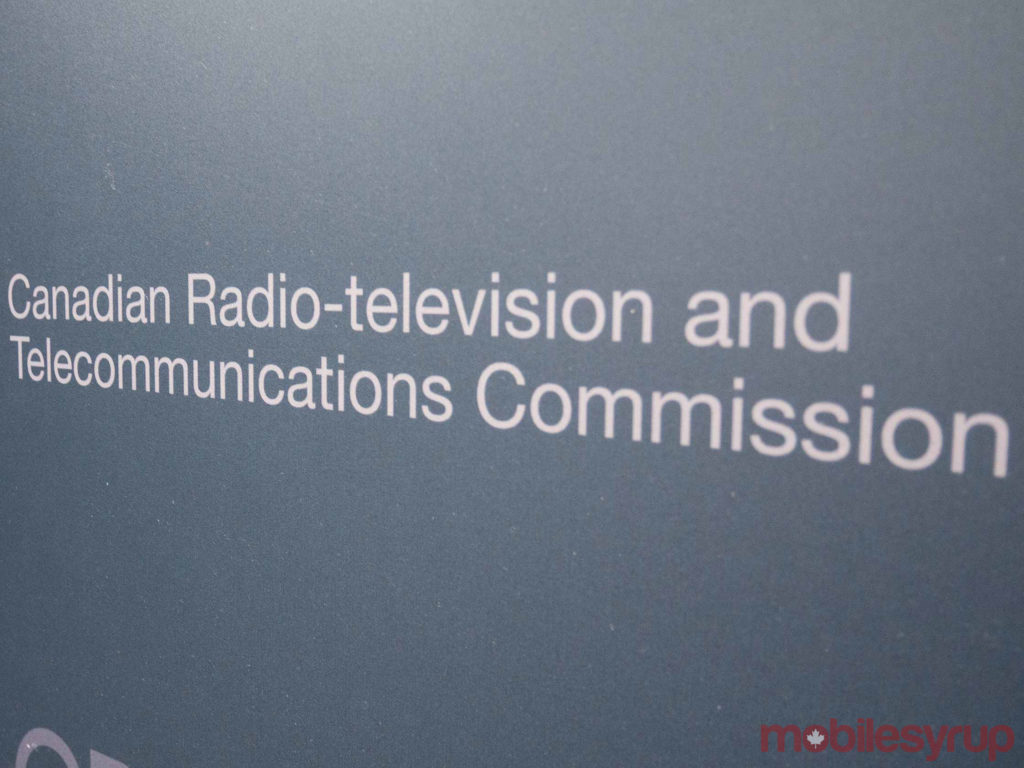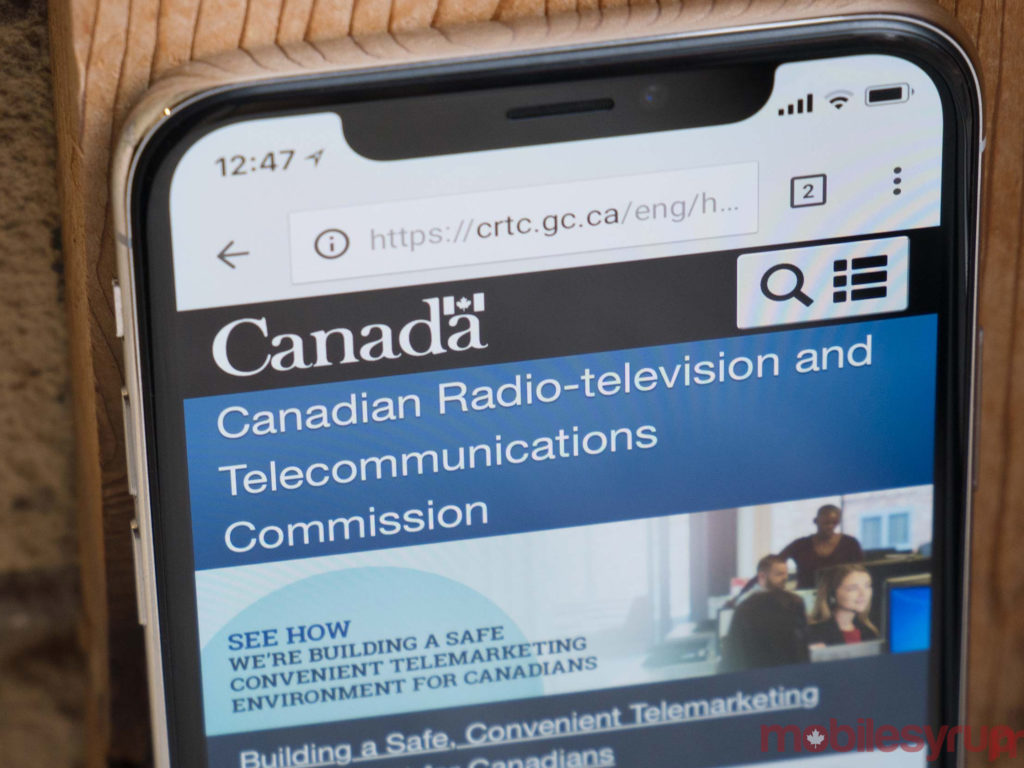Here are the top Canadian telecom stories of the year
Canada's telecommunication manufacture is often a tumultuous place, with enough steady developments to makes nigh heads spin.
This twelvemonth was no different, with subscribers, industry-watchers, analysts and everyone in-between treated to a variety of major telecom decisions that changed the Canadian telecom sector for both better and worse.
Beneath is a list of MobileSyrup's top telecom stories of the yr. Conduct in mind, not every telecom story that broke this year made the list.
CRTC closes door on Wi-Fi-first MVNOs, launches new low-cost data-only plans consultation

Each twelvemonth, the Canadian Radio-Television and Telecommunications Commission (CRTC) treats the country to a drove of small-scale decisions that often have little overall bearing on the lives of everyday Canadians.
This year, however, the CRTC seemingly went out of its mode to issue decisions on a multifariousness of open up files, including finally putting an cease to Canada'due south mobile virtual network operator (MVNO) dreams.
In a landmark March 22nd, 2018 decision, the CRTC issued its final decision on the subject of MVNOs in Canada, responding to a June 2017 need from Innovation, Science and Economical Development (ISED) minister Navdeep Bains ordering the Commission to review its March 1st, 2017 ban on Sugar Mobile.
The CRTC's final MVNO decision not but closed the door on Saccharide Mobile roaming on national carrier Rogers' network, it also effectively closed the door on MVNOs in Canada as a whole.
Here are Rogers, Telus and Bell's depression-cost data-just plan proposals

Not satisfied with endmost a door on some other grade of wireless competition, the CRTC also used March 22nd, 2018 to guild Canada's three largest carriers, Toronto-based Rogers, Montreal-based Bell and Vancouver-based Telus, to draft plans for depression-cost, information-only plans.
Though the CRTC didn't ready whatsoever rigid requirements on Canada's Big Three, the Commission recommended that Rogers, Bong and Telus stick to a $twenty/300MB proposition made past Bell.
The three carriers ultimately returned with entry-level, information-only plans of varying costs and information allotments, with Rogers proposing a $25/400MB LTE programme, Bell proposing a $xxx/500MB LTE plan and Telus proposing at least ane $xxx/500MB LTE plan.
The CRTC eventually requested that the three carriers redraft their low-price, data-just program proposals, but the fact that the Commission even ruled on the affair alone was seen by some as a positive step forward.
The Big Three returned to the CRTC on September 11th, 2018, with each carrier using its flanker brands — Fido Mobile, Koodo Mobile, Virgin Mobile, etc. — to advise at least i low-cost program with 1GB of LTE information.
CRTC ordered to investigate Canada'south big telecom carriers over high-pressure sales practices

In late November 2017, reports began to sally alleging that national carrier Bell was pressuring employees into upselling products and services that subscribers either didn't want, didn't need or didn't fully sympathize.
A similar report emerged about national carrier Rogers in January 2018, alleging that the company maintained a high-force per unit area sales surround.
The Public Involvement Advancement Centre (PIAC) soon after petitioned the CRTC to launch an research into aggressive or misleading sales practices, ultimately culminating in the Commission denying the PIAC's request on February 14th, 2018.
The controversy around misleading and aggressive sales practices seemed to simmer downward for a few months, but not before innovation minister Bains ordered the CRTC to investigate allegations of unsavoury telecom sales practices amidst Canada's large service providers.
The Commission announced plans to hold a calendar week of hearings beginning October 22nd, 2018, with the goal of compiling and submitting a study to government by February 28th, 2019.
In addition to some of the country'due south smaller players, Canadian telecom giants Telus, Bell and Rogers all delivered testimony at the hearings, publicly addressing questions near their operations and company management.
Despite the CRTC's earlier ambivalence towards investigating the unsavoury telecom sales event, the Committee grilled all groups that delivered testimony, with Commissioners requesting that groups submit written testimony to questions that weren't answered during the hearings.
CRTC to take 25Mbps download speed proposals for internet as a basic service

Industry-watchers accept been anxiously awaiting the regime'south next move on internet-as-a-basic-service since the CRTC made its ruling in Dec 2016.
While there have been few major developments in the basic service saga, the CRTC used a September 2018 to slyly revise some of its speed requirements for the deployment of internet-every bit-a-basic-service.
Whereas the Commission previously noted that Canadians should expect 50Mbps download speeds and 10Mbps upload speeds, the CRTC's September 27th, 2018 broadband fund application document revised those targets, stating that project proposals must see a minimum download speed threshold of 25Mbps and a minimum upload speed requirement of 5Mbps.
In its defence, the CRTC said that "a speed eligibility criterion of 25 Mbps download and 5Mbps upload would likely upshot in projects roofing underserved areas that would deliver a broadband Internet access service that the majority of Canadians use today."
It also argued that the revised speed requirements were the minimum threshold needed to consider project proposals, and that proposals were expected to be able to scale upwards to 50Mbps/10Mbps speeds in the future.
Even so, the Committee's subtle revisal of its earlier requirements had some advocates, similar OpenMedia, upset about what was perceived as a potential stride backwards.
Source: https://mobilesyrup.com/2018/12/27/top-canadian-telecom-stories-2018/
Posted by: beanandents.blogspot.com


0 Response to "Here are the top Canadian telecom stories of the year"
Post a Comment